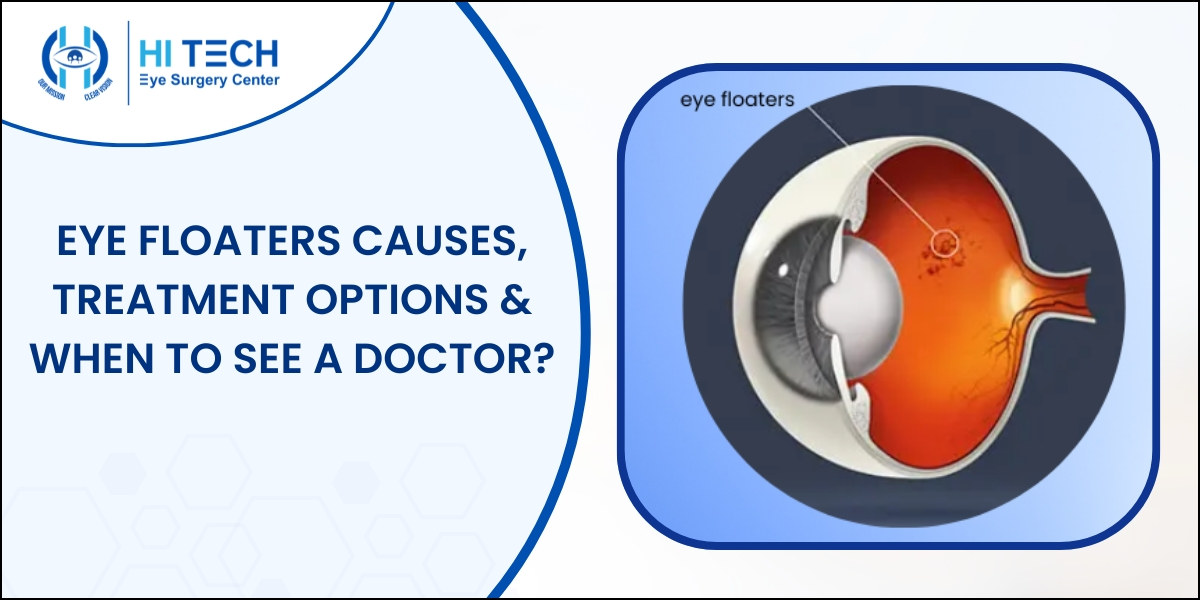When to Worry About Eye Floaters – Expert Advice & Treatment Options
Have you ever looked at a clear blue sky or a white wall and noticed tiny black or grey spots, strings, or cobweb-like shapes drifting across your vision? You blink, rub your eyes, and yet—they’re still there, moving when your eyes move. These little “floaters” can be annoying, distracting, and at times, even worrying.
At Hi Tech Eye Surgery Centre, many patients walk in describing this exact experience—concerned that something might be wrong with their eyes. While floaters are often harmless, in some cases, they can be an early sign of a serious eye condition that requires prompt attention.
What Exactly Are Floaters?
To understand floaters, imagine your eye as a small, clear ball filled with a jelly-like substance called the vitreous humor. With age or certain conditions, this gel begins to shrink and clump together. These tiny clumps cast shadows on your retina (the light-sensitive layer at the back of your eye), and that’s what you perceive as floaters.
They might look like:
- Small dark dots or specks
- Thread-like lines or cobwebs
- Rings or irregular shapes drifting around
Floaters move as your eyes move and often seem to dart away when you try to look at them directly.
Common Causes of Floaters
1. Natural Aging Process
As we grow older—usually after age 40—the vitreous gel naturally becomes more liquid and separates slightly from the retina. This process, known as posterior vitreous detachment (PVD), is the most common cause of floaters.
2. Nearsightedness (Myopia)
People who are highly myopic (nearsighted) often experience floaters at a younger age due to the elongated shape of the eyeball, which causes earlier vitreous changes.
3. Eye Injuries or Inflammation
Eye trauma or inflammatory conditions like uveitis can cause debris or cells to float in the vitreous, resulting in floaters.
4. Retinal Tears or Detachments
In some cases, when the vitreous gel pulls too hard on the retina, it can cause a tear or even detachment—an emergency situation that can threaten vision if not treated promptly.
5. After Eye Surgeries or Laser Treatments
Some people notice temporary floaters after procedures like cataract surgery or YAG laser treatment, as the vitreous gel reacts to changes inside the eye.
When Should You Worry About Floaters?
Picture this: You’re reading your morning newspaper or scrolling through your phone, and suddenly, a shower of new black spots or flashes of light appears in your vision. This is your cue to see an eye doctor immediately.
Visit Hi Tech Eye Surgery Centre without delay if you experience:
- A sudden increase in the number or size of floaters
- Flashes of light, like small lightning streaks
- A shadow, curtain, or dark area blocking part of your vision
- Loss of central or peripheral vision
These could be signs of a retinal tear or detachment, which requires urgent laser or surgical treatment to preserve vision.
How Are Floaters Diagnosed?
At Hi Tech Eye Surgery Centre, our specialists perform a comprehensive dilated eye examination to visualize your retina and vitreous cavity. Advanced imaging techniques such as OCT (Optical Coherence Tomography) or ultrasound B-scan may be used to identify retinal tears or other underlying issues. The entire evaluation is quick, painless, and crucial for ruling out serious causes.
Treatment Options for Floaters
- Observation – In most cases, floaters become less noticeable over time as your brain learns to ignore them. No treatment may be necessary if they’re mild and not affecting vision.
- Laser Vitreolysis – For bothersome floaters that interfere with daily activities, a laser procedure can help break them into smaller, less noticeable fragments.
- Vitrectomy Surgery – In rare and severe cases, a vitrectomy (surgical removal of the vitreous gel) may be recommended. This procedure can effectively remove floaters but is reserved for specific situations due to surgical risks.
Your ophthalmologist will carefully evaluate your symptoms and suggest the safest, most effective approach.
Living with Floaters: Patient Tips
- Move your eyes up and down gently to shift the floaters out of your direct line of sight.
- Avoid staring at plain, bright backgrounds for long periods.
- Keep up with regular eye check-ups, especially if you’re over 40 or highly myopic.
- Manage systemic conditions like diabetes or hypertension that may impact retinal health.


